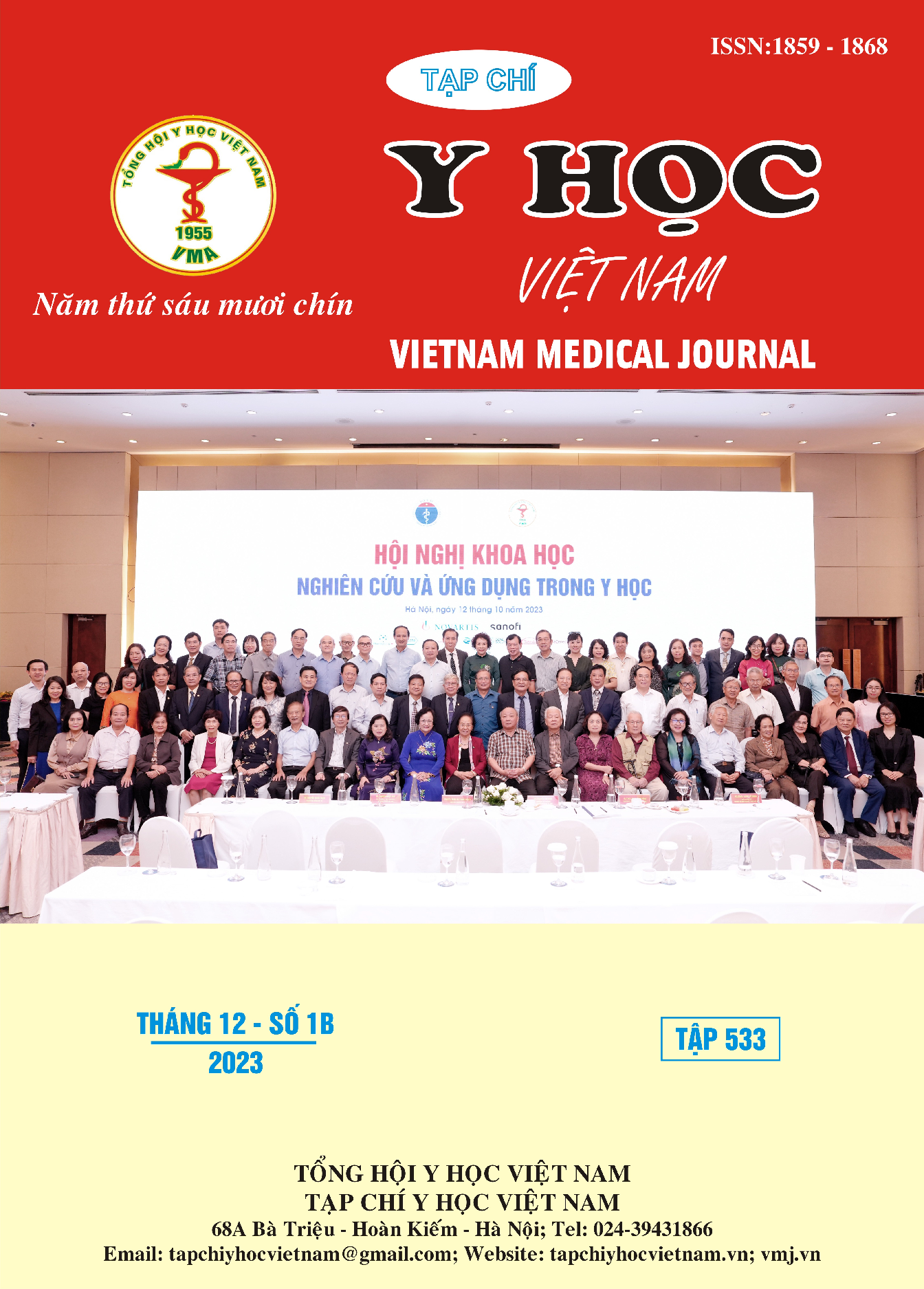CLINICAL CHARACTERISTICS AND PRELIMINARY RESULTS OF TREATMENT ALK GENE MUTATIONS ADVANCED NON-SMALL CELL LUNG CANCER WITH TYROSINE KINASE INHIBITOR – ALECTINIB
Main Article Content
Abstract
Objective: The aims of our study were to access clinical characteristics and investigate response rate and related factors of tyrosine kinase in ALK gene mutation advanced NSCLC. Patients and Methods: Describe a series of cases 26 advanced non-small cell lung cancer patients with ALK gene mutations, treated with tyrosine kinase inhibitor – Alectinib, from January 2019 to March 2023. Tumor response rate, other related factors were determined. Results: Mean age 52±14; common in women (65.4%); The majority (76.9%) of patients do not smoke. Poor overall health index PS ≥ 2 accounts for 26.9%. Metastasis from 3 or more organs accounts for a high rate of 34.6%. Brain metastasis occurs at a high rate of 38.5%. NGS testing identified ALK gene mutations in 50%, Immunohistochemistry staining in 23.1% and FISH in 26.9%. Treatment response: Complete response rate 0%, partial response 92.3%. The disease control rate is 100%. Response to metastatic lesions of the central nervous system is highly effective at 80%. Conclusion: Patients with ALK gene mutations advanced non-small cell lung cancer are common at young age, more common in women than men, and are prefer to non-smokers. Brain metastases occur at a high rate and often metastasize to multiple organs. Treatment with the 2nd generation TKI - Alectinib has a high response rate, especially with metastatic lesions of the central nervous system.
Article Details
Keywords
Tyrosine kinase inhibitors (TKIs), Alectinib, ALK gene mutation advanced non-small cell lung cancer
References
2. Nguyễn HG, Đỗ HK. đặc điểm lâm sàng, cận lâm sàng và kết quả bước đầu điều trị ung thư phổi không tế bào nhỏ giai đoạn iv có đột biến gen alk được điều trị bằng thuốc ức chế tyrosine kinase – ceritinib. vmj. 2022;519(1). doi:10.51298/vmj.v519i1.3513
3. Quyết định 4825/QĐ-BYT 2018 tài liệu chuyên môn Hướng dẫn chẩn đoán và điều trị ung thư phổi. Accessed November 5, 2023. https://thuvienphapluat.vn/van-ban/The-thao-Y-te/Quyet-dinh-4825-QD-BYT-2018-tai-lieu-chuyen-mon-Huong-dan-chan-doan-va-dieu-tri-ung-thu-phoi-390107.aspx
4. Guidelines Detail. NCCN. Accessed November 5, 2023. https://www.nccn.org/guidelines/guidelines-detail
5. Molecular epidemiological prospective study of EGFR mutations from Asian patients (pts) with advanced lung adenocarcinoma (PIONEER). | Journal of Clinical Oncology. Accessed November 5, 2023. https:// ascopubs .org/doi/abs/10.1200/jco.2012.30.15_suppl.1534
6. Peters S, Camidge DR, Shaw AT, et al. Alectinib versus Crizotinib in Untreated ALK-Positive Non–Small-Cell Lung Cancer. New England Journal of Medicine. 2017;377(9):829-838. doi:10.1056/NEJMoa1704795
7. Soria JC, Tan DSW, Chiari R, et al. First-line ceritinib versus platinum-based chemotherapy in advanced ALK-rearranged non-small-cell lung cancer (ASCEND-4): a randomised, open-label, phase 3 study. The Lancet. 2017;389(10072):917-929. doi:10.1016/S0140-6736(17)30123-X
8. Lipson D, Capelletti M, Yelensky R, et al. Identification of new ALK and RET gene fusions from colorectal and lung cancer biopsies. Nat Med. 2012;18(3):382-384. doi:10.1038/nm.2673


